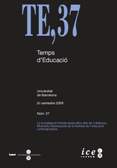On queer theory and other ways of thinking about education
Article Sidebar

Main Article Content
Assumpció Pié Balaguer
Using the hermeneutic method, the paper explores the fundamental notions of queer theory with the purpose of applying it as epistemological framework to social education. For this reason, the paper contributes to destabilizing binarisms, rethinking normality and connecting it to pedagogy. Starting from the questions posed by Kosofsky, the paper reviews the denaturalization of sex, gender and sexuality, as well as the performative nature of gender in authors such as Foucault, Wittig and Butler. These queer concepts are used to analyse heterosexual pedagogical discourses, and to present a pedagogical proposal that stresses the need to go beyond heteronormativity and normality as elements of pedagogical stability. Thus, the paper states that it is necessary to destabilize certitudes, transcend sexual dichotomy, propose the need to set the basis for a process of uneducation, invert the ‘natural’ concepts of exclusion, and ‘depedagogize’ pedagogy itself, individualizing it and focusing on rupture.
Article Details
How to Cite
Pié Balaguer, Assumpció. “On queer theory and other ways of thinking about education”. Temps d’Educació, no. 37, pp. 253-70, https://raco.cat/index.php/TempsEducacio/article/view/186895.
Rights
Copyright
Temps d’Educació reserves the right to publish the article first, with the author being granted the corresponding copyright. In addition, all the contents published in Temps d’Educació are subject to the Attribution-Non-Commercial 4.0 International (CC BY-NC 4.0) licence.Most read articles by the same author(s)
- Assumpció Pié Balaguer, Disability studies and the change in the hermeneutics of disability , Temps d'Educació: 2011: Núm.: 40
- Assumpció Pié Balaguer, Dona, cossos i diskapacitats , Temps d'Educació: 2005: Núm.: 29
- Assumpció Pié Balaguer, Vulnerability, care and education , Temps d'Educació: 2014: Núm.: 47
- Assumpció Pié Balaguer, Crisis, vulnerability and new social imaginary , Temps d'Educació: 2014: Núm.: 47